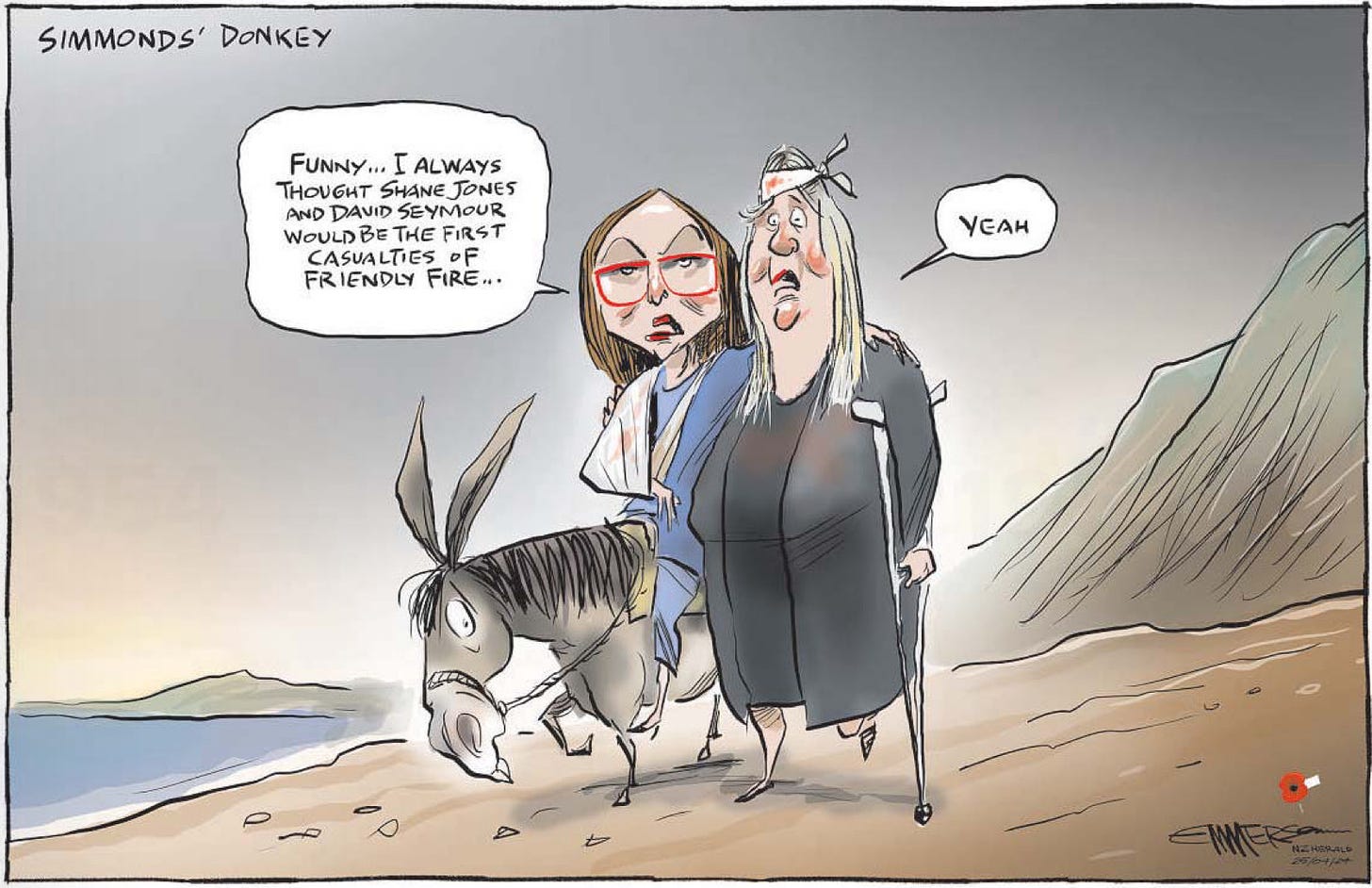TL;DR: These are the six things that stood out to me in news and commentary on Aotearoa-NZ’s political economy in the two days to 6:06am on Thursday, April 25:
Politics: PM Christopher Luxon has set up a dual standard for ministerial competence by demoting two National Cabinet ministers while leaving also-struggling NZ First and ACT ministers in place. His coalition partners already see Luxon as weak and not focused enough on the details. This reshuffle after just five months will reinforce Luxon’s own weakness in coalition relations and in his caucus.
Climate: The low-investment approach adopted by both flavours of Governments means 26 reviews of failing emergency services have led to no-or-very-slow improvements that leave Aotearoa-NZ more vulnerable to extreme climate events. That’s because politicians find it easier to cut future spending and investing to deal with uncertain and yet-to-be experienced threats, than borrowing for current spending or cutting existing services.
Transport: The Government is considering calls to put electronic monitoring devices in all vehicles to apply user charges at different rates per kilometre for travelling on different roads at different times in vehicles with different weights.
Councils: Freezes in capital and operational funding to councils are cascading down to ratepayers in the form of rates increases and cuts to council programmes designed to boost tourism and other export revenues. Despite this, the Government has recommitted to doubling export revenues within 10 years and ministers have made 25 trips overseas in five months to promote exports.
Housing: The Government’s blunt approach to spending and investment cuts has stopped the rebuilding of quake-prone apartments in Wellington dead in its tracks. The danger for the Government is its penny wise and pound foolish approach is compounding the damage in an economy in a technical recession. It also further erodes business and consumer confidence. Surveys showed confidence collapsed in March after an initial bounce in late 2023 on the Government’s promises to ‘get things done’. The coalition is now talking and freezing the economy into an extended recession, but with still-high interest rates.
Economy: The Government looks set to cut an $11.2 million industry support programme partly responsible for training software developers and marketers at 605 SaaS (Software As A Service) companies who generate almost $3 billion in exports per year.
(Paying subscribers can see more detail, analysis and links to documents and articles below the paywall fold and in the podcast above. We’ll open it up for public reading, listening and sharing if we get over 100 likes. Update: Achievement unlocked!)

1: ‘He lacks attention to detail and creates dual-standards’
PM Christopher Luxon announced a Cabinet and ministerial reshuffle yesterday that has created a dual standard of behaviour for National and non-National ministers. Having to reshuffle his first Cabinet after just five months further exposes what NZ First and ACT see as Luxon’s weaknesses: a lack of attention to detail and political inexperience.
Luxon stripped Melissa Lee of her media portfolio and demoted her from Cabinet, replacing her in Cabinet with Climate Change Minister Simon Court Watts1 and giving media role to Paul Goldsmith. He also took Disabled Services off Penny Simmonds and gave it to Louise Upston, but left Simmonds in Cabinet with her Environment and Tertiary Education roles.2
Stuff Political Editor Luke Malpass highlighted both the tensions within the coalition and Luxon’s own weaknesses in the eyes of Winston Peters and David Seymour in a column published yesterday morning in The Post-$$$ before the reshuffle was announced (bolding mine):
While the National leadership is pretty aligned with ACT on the broader things the coalition needs to do for the country, NZ First is far more transactional. It is aligned with the parties on many matters, but is always keen to remind National that everything outside the coalition deal has to be negotiated. And Winston Peters is determined that NZ First will be re-elected to Government in three years.
Also, during the coalition negotiations, both smaller parties privately complained that Christopher Luxon could at times be a high-handed poor listener who tended to lecture others without being over the detail of policies or issues himself. That was fine once negotiations had concluded and the stress was over but at the time, it did cause both NZ First and ACT to talk and get to know each other more.
That is once again occurring as ACT and NZ First both privately chafe at being publicly rebuked by the prime minister for criticising the Waitangi Tribunal. Luke Malpass in The Post-$$$
NZ Herald Political Editor Claire Trevett highlighted the double-standard created by the demotions in a column in NZ Herald-$$$ (bolding mine).
Rarely have we seen such early demotions in a new Government. Luxon has set a bar for other ministers, who face a future of what Luxon called his “constant adjustments” approach.
Usually ministers are stripped of portfolios for a scandal, a breach of the Cabinet Manual, or telling a porky to the Prime Minister or the public. In some cases, it is for incompetence that was turning into a distracting mess.
There were elements of the latter in Wednesday’s reshuffle. However - at least in Simmonds’ case - there was also an element of a minister being shifted aside for simply being a bit average.
There is a bit of risk to Luxon in this approach: if you end up moving too many ministers around for shonky performances, it starts to look a bit chaotic.
Labour leader Chris Hipkins was quick to claim that it already was chaotic, although it has not reached that bar yet. Hipkins was also, rightly, quick to point out that Luxon will find it hard to apply the same standard to his coalition partners’ ministers in NZ First and Act. NZ Herald Political Editor Claire Trevett via NZ Herald-$$$
RNZ Political Editor Jo Moir also highlighted the double-standard now in place via RNZ (bolding mine):
Lee, for example, had been opposition spokesperson for Broadcasting and Media for six years and shouldn't have been surprised by any of the problems in her portfolio, which have all been long-signalled both in New Zealand and abroad.
Luxon would have had trouble dealing with this so cleanly if it was an ACT or New Zealand First minister at fault.
The frustration for some National ministers may be that they are thrown under the bus to disguise blockages caused by ACT and NZ First. Newsroom’s Laura Walters made that point: Melissa Lee’s media Hail Mary comes up short.
Newsroom understands Lee’s sacking from Cabinet came after another failed attempt at presenting a paper to Cabinet Committee. On April 8, Lee took a paper to Cabinet Committee – the third paper she had prepared since the February 28 announcement of Newshub’s closure.
Sources told Newsroom that Luxon – who is a member of the committee – believed the proposals in Lee’s paper did not adequately deal with the complexities of the issues facing the media industry.
Lee presented her first paper to Cabinet on March 4 – at Luxon’s request. It gave senior members the lay of the land, following the announcement of Newshub’s closure and the impending job cuts at TVNZ.
But things got rocky for Lee after she started proposing ways to fix these problems. Newsroom understands Lee got ahead of the Cabinet process when preparing her next Cabinet Committee paper and was ordered to carry out further consultation with coalition partners – specifically NZ First.
After almost a month of working with officials and consulting with coalition partners, Lee tried again. But she came up short. Her attempt to take a refreshed proposal to Cabinet committee on April 8 would have been a factor in Luxon’s Cabinet reshuffle. Laura Walters via Newsroom
Former National Minister Press Secretary Ben Thomas also pointed to the double standard, and the risk of overloading senior ministers, in his column for The Post-$$$.
This is another danger for Luxon. He can pick and unpick his National ministerial cohort at will, but his partners’ ministers are still off-limits. Setting wildly divergent expectations can look like hypocrisy (although it can also look like a sellable difference between allied parties jockeying for crossover votes in 2026).
Insiders say Simmonds has struggled with the workload across her portfolios, and that the disabilities carer payment changes were not the only significant official-led announcements that passed under her risk radar.
The question now is what becomes of the media portfolio, for an already laden Paul Goldsmith who is also juggling justice, state-owned enterprises, Waitangi Tribunal claims, and arts, culture and heritage. Ben Thomas in The Post-$$$.
Quotes of the day
Rolling and shuffling
“This is how I roll. This is how I lead. This is simply about me looking across my team, I want to make sure I've got my aces in their places.” PM Christopher Luxon in a news conference announcing the reshuffle.
And detaching?
“The wheels are falling off already.” Labour Leader Chris Hipkins in a news conference on the reshuffle.
2: More reviews can’t hide a remorseless sinking lid
RNZ’s Phil Pennington wrote a very useful backgrounder on Wednesday via RNZ on the latest inquiries into Aotearoa-NZ’s failing emergency management systems in the wake of Cyclone Gabrielle and Auckland’s Anniversary weekend floods last year.
It’s a detailed account of repeated failures by Governments of both flavours to invest in new technology for disaster management and 111. It also highlights the unpreparedness for future climate events, given Gabrielle was only a ‘moderate’ one. Pennington quotes NEMA in a BIM last November.
"While devastating to the communities involved, Cyclone Gabrielle can be considered as a moderate scale event when compared to what New Zealand could experience," the National Emergency Management Agency (NEMA) said in a briefing to the incoming minister last November.
"As seen with recent severe weather events, the emergency management system can be easily overwhelmed with a moderate scale event."
There are now at least 26 inquiries into how it was "easily overwhelmed", by cyclones Gabrielle and Hale, and by the Auckland Anniversary floods.
Most of these are by consultants working for Civil Defence and critical industries like telecoms. A glance through just 10 of the inquiries counts 600 pages of findings and advice, and more than 120 recommendations.
Many of them echo similar findings and advice from 2017, 2020 and other past reviews into emergency response shortcomings. Phil Pennington via RNZ
The lack of progress since 2017 reflects the low-investment approach now endemic across Government and business after 30 years of constantly pressing down on growth in Government spending to ensure spending, taxation and public debt stay under 30% of GDP, allowing room for capital gains to remain tax free and for ongoing increases in post-interest disposable income for home owners.
That’s impossible because rising inequality, healthcare costs naturally rising faster than GDP and ageing populations keep putting enormous upward pressure on the size of Government.
This sinking lid is constantly squeezing down and squashing investment and capital spending in particular because that is always the easiest to cut. Cutting public services already in existence today in the face of immediate opposition is harder than cutting future spending or preparing for future events, given future voters have no say in the decisions and can’t compete with the recency bias and status quo bias that dominates the thinking of most decision makers — consumers, voters, businesses, ministers and public servants alike.
The sinking lid problem is most evident in health and education, as these headlines from yesterday indicated:
Scoop by RNZ’s John Gerritsen.: Roles providing support for disabled kids among those proposed to be axed
Documents leaked to Gerritsen again expose the framing of back office vs front office as specious (bolding mine):
They showed the proposed loss of nearly 600 roles at the ministry in response to the government's order for a 7.5 percent spending cut will not fall evenly across the ministry's (MOE) divisions.
Among the hardest hit would be the Curriculum Change team, where nearly all jobs would be cut, and the division in charge of the Māori curriculum and te reo Māori, where most staff would have to reapply for a smaller number of roles.
One of the biggest divisions, Te Pae Aronui, proposed cutting more than 200 roles, saving $19 million a year. It said it had 705 positions and could disestablish 247, including 106 that were vacant, and after creating new positions would have a total of 489 staff.
The disestablished roles included people involved in work that helps schools with children with disabilities and with projects such as free school lunches that tackle inequities for Māori and Pacific children.
The cuts included all seven nutritionists or nutrition advisers and one food safety advisor understood to be involved in the free school lunch scheme, Ka Ora Ka Ako. The proposed new structure did not appear to include any nutrition or food safety roles.
News links elsewhere on this issue
Job cuts at Oranga Tamariki could mean return to ‘crisis system’. Former minister Tracey Martin warns “children will be worse off“ with law change at OT. Tova O’Brien interview via Stuff.
Leaked document reveals millions of dollars of cuts at Te Whatu Ora, by Newsroom’s David Williams.
Over 300 health and safety issues found in school tech classes. Unguarded machines, faulty emergency stops and toxic fumes were just some of the issues discovered in 131 schools during a spree of WorkSafe assessments, by The Press-$$$’s Brett Kerr-Laurie
Op-ed by Lianne Dalziel in Newsroom: Lessons identified must become lessons learned for emergency preparedness
3: ‘Track every car for every metre to get perfect users pays’
The user pays push to pay for infrastructure makes sense to ‘manage demand’ and is a tempting way to avoid the Government borrowing from its own balance sheet, as this piece indicates: Govt looks at ways to pay for its long list of new roads.Fuel taxes could soon be gone and a new type of user pays system introduced for all drivers 1News. This bit was of particular note (bolding mine):
Infrastructure NZ now wants the Government to move faster in getting e-road units installed in all of the country's passenger vehicles — tracking which roads people use.
(CEO Nick) Leggett said it may "take a bit of time for Kiwis to get their head around it because it's new … But we know we can't keep having a free lunch." 1News
Congestion charging and road user charges are good at managing demand to avoid unnecessary overbuilding, but only work and are fair when alternative ways to get around cheaply are already there.
But this creates a risk of a consumer and voter backlash, and/or a deeply unfair transition to carbon zero that pumps up costs of living for those least able to afford it. It also pumps up inflation and keeps interest rates high for even longer, which also makes transport investment more expensive
4: Beehive’s cost-cutting keeps cascading down to councils
This paywalled piece by The Press-$$$’ Tina Law: Council forces investment company to cough up higher dividends is another indicator of the stress cascading down from the great investment and spending freeze of 2024.
Christchurch City Holdings Ltd (CCHL) chairperson Abby Foote told the council last week there is “no more money”. She said the company was not able to pay down debt, grow dividends to the council, invest in resilience and grow critical infrastructure.
“These things simply do not add up. We cannot do them all and this is what we have been saying for the last 12 months.”
She said the company was not able to pay down debt, grow dividends to the council, invest in resilience and grow critical infrastructure.
“These things simply do not add up. We cannot do them all and this is what we have been saying for the last 12 months.”
5. ‘Double your exports, but don’t expect help from us’
The Government and the PM talk a good game on exporting our way to higher incomes and relevance. Ministers have also also flown a good game, taking 25 trips overseas in five months, as The Post-$$$’s Thomas Manch reported. But the Government itself is cutting back on help for councils and industry at a more local level. One area of concern is in council support for local tourism businesses, as Hawkes Bay Tourism Chairperson (and former head of Tourism NZ) George Hickton told RNZ Checkpoint.
Hawke's Bay Tourism's website would shut down and all of its connections with local and national media would be severed, he said.
"We know that tourism in Hawke's Bay will start to deteriorate quite quickly. Without reminding people that we are an attractive destination, other regions will fill that slot." George Hickton told RNZ Checkpoint.
6. SaaS exporters fear cut to key training funds
Chris Keall reported for NZ Herald-$$$ that tech exporters are pleading for the Government not to cut an $11.2 million funding programme behind KiwiSaaS, which funds training for 605 companies that generate $3 billion of exports. They have written a letter to Technology Minister Judith Collins.
The insider said he feared KiwiSaaS could become “collateral damage” in the Government’s broad-strokes cost-cutting efforts, “when this is exactly the sort of thing they need to be doing to boost productivity and exports”. The average salary in the sector was $105,000, he said.
A spokesman for Collins said she could not immediately comment because she was travelling. Collins, who also holds the Defence portfolio, is set to attend Anzac Day commemorations in Belgium after an OECD conference in Paris this week. He could not immediately confirm if she had responded to the KiwiSaaS letter.
The pick of the links elsewhere in our political economy
Housing and transport
Paywalled column by Georgina Campbell in The NZ Herald-$$$ Devastating blow for apartment owners hidden in Govt announcement
Rotorua councillor hits out over homeless motels: 'They have taken us for fools', by Rotorua Daily Post-Local Democracy Reporter Laura Smith
Paywalled column by Virginia Fallon for The Post-$$$: A tiny victory for a mean neighbour. What sort of person dobs in their neighbour for living in an unconsented tiny house?
The tiny town where a three-bed home is under $300k.It’s as remote as can be, with a population of just over 2000, and a median house price of $190,000 by Stuff’s Kylie Klein Nixon. (Spoiler alert: It’s Murupara)
Poverty and inequality
'Dishonesty': 50k off benefits will include people who die, go to prison by 1News’ Felix Desmarais
Health, education and justice
'Serious public health issue': Concerns about nitrate levels in drinking water by RNZ’s Anna Sargent
Wages, income, tax and population
Foreign doctors struggle with Kiwi culture, Otago study finds. NZ Herald
Politics, Government and councils
Paywalled scoop by NZ Herald-$$$ Deputy Political Editor Thomas Coughlan: Questions over conflict of interest in fast-track case.
Scoop by Newsroom’s Emma Hatton: New emergency services radio network plans off-track
'They can stick their tax cuts', cancer patient, tells RNZ Checkpoint’s Lisa Owen
'Relentless, brutal but meaningful': Tory Whanau reflects on mayoralty and MP rumours, by NZ Herald’s Georgina Campbell from an interview
Cartoon of the day
Timeline-cleansing nature pic of the day
Surface tension
Ka kite ano
Bernard
So much for my criticism of attention to detail…
PM’s statement via Beehive.govt.nz and new ministerial list attached.

















'Lacks attention to detail and is creating double-standards.'